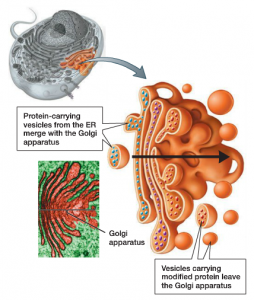Golgi Apparatus
Golgi Apparatus
The Golgi Apparatus appears in the cell as a series of flattened sacs, resembling a series of stacked bowls. Let’s explore the function of these important organelles now…

Golgi Apparatus
As described in the introduction, the Golgi Apparatus appears as a series of flattened sacs in the cytoplasm. The Golgi Apparatus performs three key functions in the cell:
- Receives proteins and lipids produced by the ER
- Modifies (processes) these macromolecules into their final form and…
- Directs the macromolecules to their final destination (either inside the cell or out to the external environment)

The Golgi Apparatus was first observed by Camilo Golgi, whom they were named after, in 1898.

In the manufacturing plant analogy, the Golgi Apparatus acts like the shipping department, receiving products or goods from the factory floor, packaging and shipping them out to their final destination.
Golgi Apparatus
As described in the introduction, the Golgi Apparatus appears as a series of flattened sacs in the cytoplasm. The Golgi Apparatus performs three key functions in the cell:
- Receives proteins and lipids produced by the ER
- Modifies (processes) these macromolecules into their final form and…
- Directs the macromolecules to their final destination (either inside the cell or out to the external environment)
The video below describes the features and functions of the Golgi Apparatus in the cell:
Summary
The endomembrane system within eukaryotic cells includes the nuclear envelope, endoplasmic reticulum (ER), Golgi Apparatus, lysosomes and other vesicles. The Golgi Apparatus appears as a series of flattened membrane-enclosed sacs which serve to process and modify materials (proteins and membranes) which are produced in the ER. Substances which are modified in the Golgi are sorted and packaged into vesicles for transport elsewhere in the cell.
The Golgi Apparatus serves as the Shipping department for the cell.